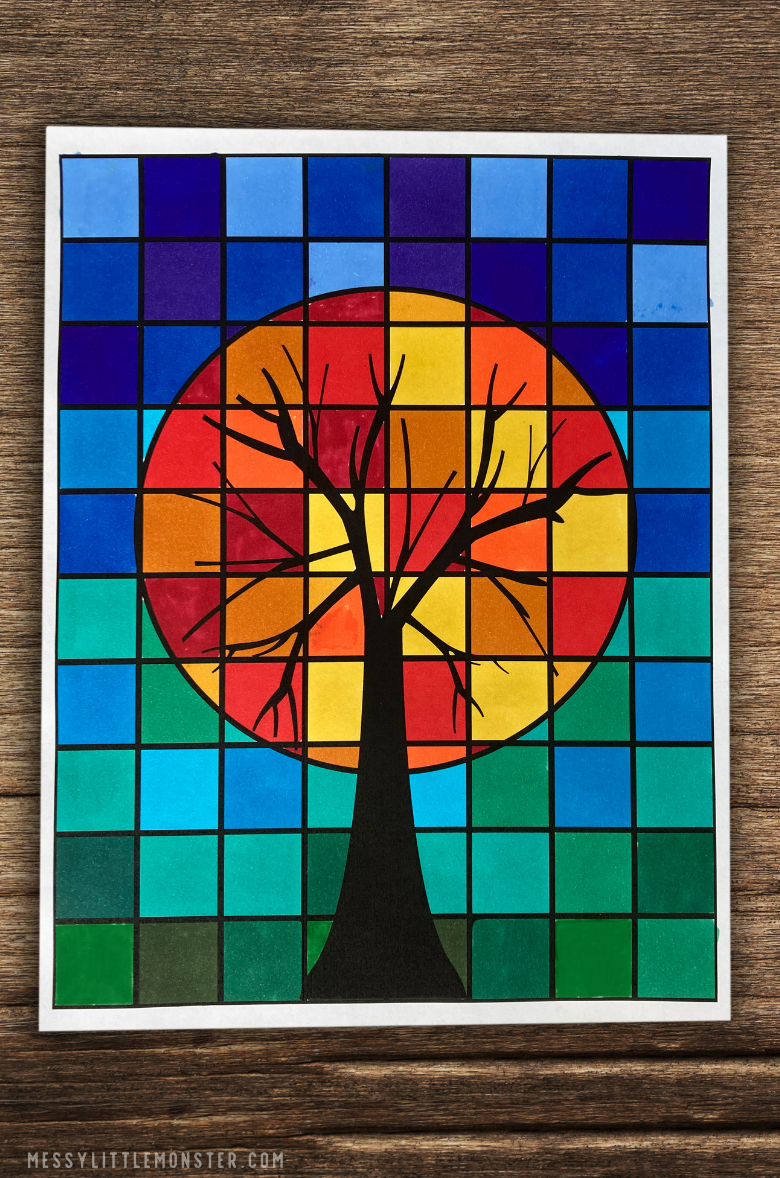Have you ever looked at a painting and felt a rush of warmth, or a sense of calming coolness? The colors an artist chooses wield immense power in evoking emotions and creating dynamic compositions. Understanding the interplay of warm and cool color drawings is like unlocking a secret code to elevate your artwork.
Imagine a fiery sunset, ablaze with oranges, reds, and yellows. These are warm colors, full of energy and vibrancy. They tend to advance in a composition, seeming closer to the viewer. Now, picture a serene mountain lake, painted in blues, greens, and violets. These cool colors recede, creating a sense of depth and tranquility.
The beauty of warm and cool colors in drawing lies in their contrasting nature. When used strategically, they can create stunning visual effects. For instance, a splash of warm orange against a cool blue background will instantly draw the eye. This technique, known as complementary color contrast, adds visual interest and vibrancy to your work.
But the magic doesn't stop there. Warm and cool colors are not limited to their literal temperature associations. A skillful artist can use warm colors to suggest closeness and intimacy, even in a cool-toned landscape. Conversely, cool colors can be used to portray a sense of isolation or melancholy, even in a predominantly warm composition.
Understanding the nuances of warm and cool color drawings is an ongoing journey of exploration. By experimenting with different color combinations, you'll discover your own artistic voice and create artwork that resonates deeply with viewers.
Advantages and Disadvantages of Using Warm and Cool Colors
While both color palettes offer unique benefits, understanding their limitations can further enhance your artistic choices.
| Feature | Warm Colors | Cool Colors |
|---|---|---|
| Emotional Impact | Energy, passion, excitement | Calmness, peace, serenity |
| Visual Impact | Advance, appear closer | Recede, create depth |
| Potential Drawbacks | Can feel overwhelming if overused | Can feel distant or detached if not balanced |
Mastering the Art: Best Practices for Warm and Cool Color Drawings
Ready to infuse your artwork with the power of color temperature? Here are some effective strategies:
- Start with a Limited Palette: Begin by experimenting with a few warm and cool colors to understand their interactions before incorporating a wider range.
- Utilize Color Contrast: Place warm colors against cool colors to create vibrant focal points and add visual interest.
- Consider Mood and Atmosphere: Choose your color palette based on the emotions you want to evoke in your artwork.
- Experiment with Color Temperature Shifts: Gradually transition from warm to cool colors within a single object to create a sense of volume and dimension.
- Practice Regularly: The more you work with warm and cool colors, the more intuitive your color choices will become.
FAQs: Demystifying Warm and Cool Color Drawings
Still have questions? We've got you covered!
- Q: Can I use both warm and cool colors in the same drawing?
A: Absolutely! In fact, using both warm and cool colors together creates contrast, visual interest, and a sense of balance. - Q: What are some examples of warm and cool grays?
A: Warm grays have red, orange, or yellow undertones, while cool grays have blue, green, or purple undertones. - Q: How can I create a sense of depth using warm and cool colors?
A: Use warmer colors for objects in the foreground and cooler colors for objects in the background to create an illusion of distance. - Q: Are there any rules for using warm and cool colors?
A: While guidelines exist, art is subjective! Feel free to experiment and break the rules to discover what works best for you. - Q: Where can I find inspiration for warm and cool color palettes?
A: Look to nature, photography, and other artists' work for inspiration. Online color palette generators can also be helpful tools.
The journey of mastering warm and cool color drawings is one of continuous learning and exploration. As you experiment and refine your techniques, you'll discover the limitless possibilities these color palettes offer. Embrace the challenge, unleash your creativity, and watch your artwork come alive with newfound depth, emotion, and visual impact.
Pin by Karla Alv on Art Lessons - The Brass Coq
warm and cool colors Classroom Art Projects, Elementary Art Projects - The Brass Coq
Warm and Cool Color Trees - The Brass Coq
Artists For Kids: Second Grade - The Brass Coq
warm and cool color drawings - The Brass Coq
2nd draw out line of wave. Warm colors for sun and cool colors for wave - The Brass Coq
Warm And Cool Colors Drawing - The Brass Coq
Colores cálidos y fríos - The Brass Coq
Cool Colors Drawing at GetDrawings - The Brass Coq
Warm And Cool Colors Design - The Brass Coq
Hot And Cold Colours Worksheet - The Brass Coq
sudic transmisie sinucidere warm and cool colors painting Observare cu - The Brass Coq
Warm/cool chromatic work #artideas - The Brass Coq
Warm And Cool Colors - The Brass Coq
warm and cool color drawings - The Brass Coq














